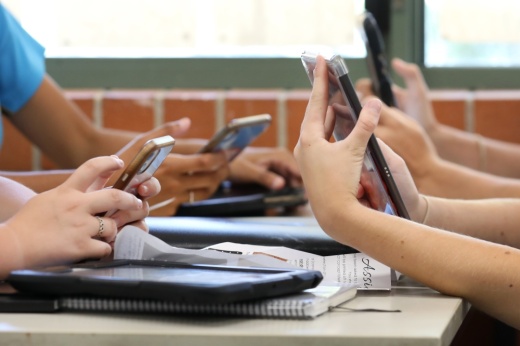FISD board of trustees discussed the potential policy at its Jan. 13 meeting.
What’s happening?
FISD’s core learning team, which consists of assistant principals and counselors, started researching the impact of social media and cell phones on learning and social emotional development in the fall, Kim Cole, FISD’s assistant superintendent of secondary teaching and learning, said at the meeting.
Cellphone use is prohibited during the instructional day at FISD unless a teacher permits their usage, officials said.
Once a cellphone is confiscated, the teacher will turn the phone into the school principal’s office. The principal will determine whether to return it to the student at the end of the school day or to contact the parents to pick up the device at the end of the day, according to the FISD student handbook.
Diving in deeper
After the core learning team researched the impact, FISD gathered data from 40 comparison schools in Texas. The results showed several other districts were in a similar spot as FISD in terms of trying to figure out what kind of cell phone policy to implement, Cole said.
The district then virtually met with officials from four other districts, two of which said they had an “away for the day” policy that prohibits students from accessing their cell phones for the entire school day. The other two districts also had an “away for the day” policy, but used YONDR pouches, which are lockable phone pouches.
YONDR pouches are magnetically locked, and can be unlocked through a magnetic unlocking device, according to the business’s website. Cole said if the district chooses to invest in the pouches, unlocking stations will be created on campuses, and portable unlocking devices will be given to coaches and extracurricular staff members for students that participate in sports, clubs or after school events.
After speaking with other districts, FISD officials conducted a teacher survey regarding the implementation of the current policy. While the full survey results will not be available until March, Cole said officials felt each campus made intentional efforts to enforce the current policy.
However, some data the district released on Jan. 14 showed that:
- 97% of students admitted to using their cell phones during school hours, spending an average of 43 minutes per day on social media, YouTube or games
- 72% of high school teachers said cell phones are a “major distraction”
- 35% of teens admitted to using their cell phones to cheat on school work
- 41% of teens with the highest social media usage rated their overall mental health as poor or very poor
The district has begun to share data collections, or mini-lessons, on the impact of cell phones through its social media pages. The data shared stems from research originally conducted by the FISD core learning team in the fall semester, Cole said.
FISD officials have also established a “Think Tank,” which consists of 25-30 members that are students, teachers, parents, counselors and administration from each campus, Cole said.
The Think Tank will have two learning sessions Jan. 21 and Feb. 11 to discuss what the district has learned and gathered about cell phone and social media impacts, as well as the pros and cons to different cell phone policies.
FISD officials are hoping to bring a potential cell phone policy as an informational item at the March board meeting, with a potential action item for consideration at the board’s April meeting, Cole said.





